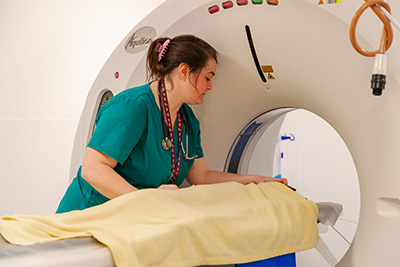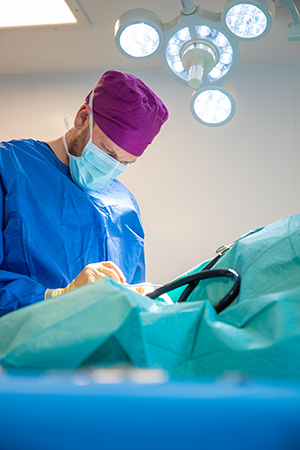Why should I bring my pet to West Midlands Veterinary Referrals for spinal surgery?
At West Midlands Veterinary Referrals, our expert team is highly experienced in treating thousands of patients across a range of surgical procedures, including spinal surgery. With access to advanced diagnostic imaging and supported by a dedicated team of RVNs providing round-the-clock care and post-operative monitoring ensures the best possible patient care when it is needed most.
Most treated conditions:
- Compression of the spinal cord and spinal nerve roots can be an acute emergency requiring the burring of windows in adjacent bone to relieve compression. Hemilaminectomy, dorsal laminectomy and ventral slots are some of the techniques we use to address these problems. Our high-spec CT scanner is a very important tool used in many spinal surgeries.
- Fracture fixation: where the spinal cord is not completely transected by trauma, the results of surgical stabilisation can be extremely good and extremely rewarding. But these cases need the proper care before, during and after surgery if the desired outcome is to be achieved.
 What is Spinal Surgery?
What is Spinal Surgery?
Spinal surgery for intervertebral disc disease involves accessing the spinal canal to remove any disc material that is compressing the spinal cord and to prevent any more disc material from ‘slipping’.
Surgery to access the spinal canal and relieve any compression of the spinal cord. This is usually in the form of abnormal intervertebral disk material. Most commonly accessed through an incision in the patient’s back or ventrally if needing to operate on the neck.
What are the most common conditions that require spinal surgery?
Intervertebral disc disease (IVDD) is a common disorder of the spine in dogs. It can affect the neck, thoracic, and lumbar regions, as well as the junction between spinal regions (thoracolumbar and lumbo-sacral).
IVDD is most common in breeds with short legs and long bodies (known as chondrodystrophic breeds), such as Dachshunds, Bulldogs, Cocker Spaniels, and Basset Hounds. However, it can also occur in non-chondrodystrophic breeds, such as German shepherds, Labrador Retrievers, and many others.
What are the signs of Intravertebral Disc Disease?
Intravertebral disc disease can manifest with several symptoms, including:
- Back pain
- Partial or complete loss of neurological function to some or all limbs,
- Loss of pain sensation in some or all limbs
- Changes to reflexes in the limbs or back
- Neck pain
How is Intravertebral Disc Disease diagnosed?
IVDD is diagnosed through a combination of physical and neurologic examinations. Advanced diagnostic imaging equipment, such as a CT scanner, is used, along with a contrast agent that is injected into the spinal canal (myelography) to clearly demonstrate the location of the IVDD. In some cases, an MRI scan is also required to support the diagnosis.
 What treatments are available?
What treatments are available?
For patients with only manifesting pain or mild loss of limb function, conservative treatment is appropriate. This may comprise of strict cage rest, anti-inflammatories, and other forms of pain relief.
In surgical cases, a hemilaminectomy is often performed to remove any abnormal disk material from the site of spinal cord compression and relieve the source of the problem.
Surgery in the region of the neck requires a ventral slot, which involves access to the canal through the underside of the neck.
What can I expect if my pet is treated for Intravertebral Disc Disease?
The prognosis for patients with IVDD is generally good. Conservative management can be successful in patients with neck pain who don’t show signs of spinal cord injury, such as weakness and incoordination. Approximately a third of patients treated medically might relapse and require further advanced diagnostic imaging and, eventually, surgical management.
The success rate with surgery is generally high as long as the spinal cord hasn’t been compressed for a long time, resulting in a chronic spinal cord injury.
Physiotherapy can form an integral part of the rehabilitation process for patients who have undergone surgery. To find out more about our in-house Veterinary Physiotherapy service, click here.
Our Fixed-Price Packages for Spinal Surgery
Our fixed-price packages include:
- Initial consultation
- Anaesthesia
- Surgery (including disposables)
- Pre and post-operative radiographs
- In-patient medications
- Discharge medications to go home with for the first week
- Two nights overnight stay (hospitalisation)
- Re-checks and follow-up radiographs for three months following the procedure.
|
Service | Price |
Extra's Included |
|---|---|---|
|
Thoracolumbar Fenestration and Thoracolumbar Hemilaminectomy (all sizes) |
£5,010 | Veterinary Physiotherapy whilst in hospital |
|
Lumbosacral Dorsal Laminectomy (all sizes) |
£5,110 |
Veterinary Physiotherapy whilst in hospital |
| Cervical Ventral Slot | £5,500 |
Veterinary Physiotherapy whilst in hospital |
| Transilial Pin | £5,800 | Veterinary Physiotherapy whilst in hospital |



